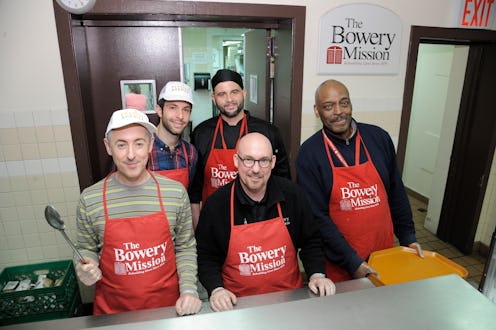News
All The Charities In The Country Can't Fix Trump's Food Stamp Mess

On Tuesday, Donald Trump revealed his budget proposal for the coming fiscal year, which still needs to be approved and implemented by Congress. There is already concern over the noticeable budget cuts to SNAP funding, also known as the Supplemental Nutritional Assistance Program, and the effect it would have on the most vulnerable families.
Critically, it's through SNAP that low-income individuals and families receive food stamps. According to a report from the Associated Press, Trump's budget proposal would cut food stamp funding by as much as $193 billion during the next decade. The Trump administration's budget plan would eventually require states to provide 25 percent of SNAP funding. One of the other ways Trump's budget would cut SNAP's program funding is by restricting benefits to recipients who are able-bodied adults with dependents. This means that funding could potentially go down for children, as well as the elderly and recipients with disabilities, who at this point receive the largest portion of SNAP benefits.
A report from Share Our Strength, a national nonprofit targeting child hunger, revealed that 64 percent of SNAP benefits goes toward children, elderly, and disabled people. Thus, Trump's proposed budget could potentially make it difficult for children, the elderly, and people with disabilities to have access to the food they need for healthy lives.
Lucy Melcher, an advocate for Share Our Strength, tells Bustle that without the help of federal nutrition funding such as SNAP, already thinly spread food charities will face even larger obstacles, and a larger demand.
"I think the bottom line is that charity can’t make up the gap this budget proposes. The charities and faith-based organizations that exist are already strapped, they’re already doing more than they can do on a daily basis."
"We know there’s a lot of overlap between people who enroll in our Cooking Matters classes [which teaches families how to buy and cook more nutritional food in affordable ways] and people who benefit from SNAP. So, the cuts we saw from the budget today were really devastating on multiple levels," Melcher says.
Melcher emphasizes the fact that because many food charities are already reliant on donations and volunteers, there is no way they can fill the void of government funding.
"I think the bottom line is that charity can’t make up the gap this budget proposes. The charities and faith-based organizations that exist are already strapped, they’re already doing more than they can do on a daily basis," Melcher says. "SNAP has always been the backbone of the anti-hunger movement. We know that emergency feeding programs can’t make up the gap, they’re already stretched too thin."
Natasha Thompson, the president and CEO of the Food Bank of the Southern Tier in New York state, which is part of the larger network food banks affiliated with Feeding America, tells Bustle that her food bank currently provides food to a network of 160 community-based organizations. She says 15 percent of their food was provided through federal funding and that last year, that amounted to 11 million pounds of food. If government funding is stripped even more, it would place even more pressure on operations like hers, Thompson says.
"It’s already a marginal and strained network. Charity is not the answer to the problem of hunger."
"If we see SNAP benefits get block-granted, it’ll mean more people will come to the food pantry," explains Thompson. "We provide services for about 160 community-based organizations, 86 percent of those organizations are entirely run by volunteers. The average food pantry volunteer is a 75-year-old lady, and most of these are housed in churches. It’s already a marginal and strained network. Charity is not the answer to the problem of hunger. Every bag of food we provide is only 20 percent of the amount government programs can provide."
Even if they received an increase in support, charities and food banks cannot do the same amount of work as federal funded-programs, argues Thompson.
"It’s one of the most effective programs to keep people out of poverty, and it’s also one of the least abused. It goes up when the economy is down, and it goes down when the economy goes up," she says. "It has this ripple effect that is incredibly positive, and half of SNAP recipients are children."
For Thompson, there's no question that good-willed charities can make up for Trump's potential damage. "There’s absolutely no way that charity can ever replace federal distribution," she says.